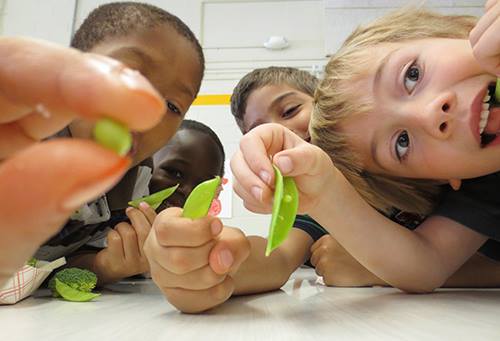






 Mendota Elementary participates in REAP's Farm to School program (Photo Credit: REAP Food Group)
Mendota Elementary participates in REAP's Farm to School program (Photo Credit: REAP Food Group)
From farmers’ fields to dinner tables in the community, REAP Food Group is committed to building an environmentally and economically sustainable food system throughout the region.
REAP Food Group is committed to decreasing the distance from farm to table, supporting family farmers and encouraging sustainable agricultural practices, according to the group’s 15-year-old “good food mission.”
Additionally, the group’s mission includes building a regional food system that is “healthful, just and both environmentally and economically sustainable.”
“Now is the time for local food,” said Theresa Feiner, REAP’s Buy Fresh Buy Local program manager.
University of Wisconsin-Madison Professor Jack Kloppenburg was influential in founding REAP through the creation of the Food for Thought Festival and by advocating for stronger food system development in the community.
Feiner said the organization has since evolved from the festival and morphed into a non-profit organization.
REAP operates three programs: Buy Fresh Buy Local, Farm to School and Southern Wisconsin Farm Fresh Atlas.
Buy Fresh Buy Local is REAP’s farm to restaurant program that connects farmers with approximately 40 different restaurant partners, according to Feiner.
“We try to help them reach new diners to tell their story about their connection with local farmers,” Feiner said.
Additionally, Feiner said REAP encourages restaurants to buy directly from farmers instead of using a middle-man.
 Local Harvest: Cycle the Sun 2013 (Photo Credit: REAP Food Group)“That’s really good going back to our mission statement, being economically sustainable because farmers get a bigger cut of the profit margin,” Feiner said.
Local Harvest: Cycle the Sun 2013 (Photo Credit: REAP Food Group)“That’s really good going back to our mission statement, being economically sustainable because farmers get a bigger cut of the profit margin,” Feiner said.
In the local food business, Feiner said she sees a trend toward supplying healthcare institutions such as senior homes and hospitals with locally-sourced food.
Feiner recently partnered with American Family Children’s Hospital to open a farmers’ market cafe inside the hospital.
“We see that institution as sort of being the next big thing for local foods in Madison,” Feiner said.
Farm to School, another REAP program, provides a locally-sourced snack once a week to the nine “neediest” elementary schools in the Madison school district. Additionally, the program manager works with the nutritional director at each school and a chef visits the school once a week to provide hands-on training and food education.
Chef Joey Dunscombe of the Weary Traveler Freehouse, located at 1201 Williamson St., participates as a chef in the program. He tries to teach the kids to understand the importance of local food, one of which is promoting a strong local economy.
“The kids love it,” Dunscombe said. “They get to cook, and they get to hang out with the chef.”
As someone who always wanted to be a teacher, Dunscombe said it is important to teach kids about healthy eating early on rather than first learning about nutrition in a college class.
Despite the benefit the Farm to School program provides, it does not “get at the core of the issues,” one of which according to Feiner is the supply of local food.
“We know that there is demand out there, but we lack the infrastructure to basically aggregate and distribute products,” Feiner said.
The third program through REAP, Southern Wisconsin Farm Fresh Atlas, lists farms, businesses, restaurants and farmers’ markets that sell directly to customers. This booklet is available online and in print in various establishments throughout Madison.
All of the farms listed in the atlas are family or cooperatively owned, sell Wisconsin products that the farm has grown or helped produced and are committed to using fewer synthetic pesticides and fertilizers.
Additionally, farms pledge to operate in a way that will protect the area’s land and water resources, treat animals with care and provide safe and fair conditions for employees.
John Binkley, the owner of Equinox Community Farm in Waunakee, WI, said although he is not sure how much of his business is driven through the atlas, REAP’s Farm Fresh Atlas is beneficial in building a community around local food.
“I think they fill a niche that nobody else is in terms of [promoting local food],” Binkley said.
Businesses in the program that work with the farm are also family or cooperatively owned or are non-profit organizations with the goal of promoting a sustainable, regional food system.
These businesses also pledge to sell products grown on farms in Wisconsin make products with raw materials grown on Wisconsin farms, or use sustainably raised ingredients in production.
“Our whole goal in a nutshell is to create more awareness to increase that consumer demand [for local food],” Feiner said.
|
|
|
Welcome to the Madison Commons, a website designed to provide news and information about all of Madison's neighborhoods and a crossroads for the discussion of community issues. The name comes from the idea of a village commons, a place for news, talk, debate, and some entertainment, too, that's open to everyone.
All rights reserved. Read more about the Madison Commons and its partners.

